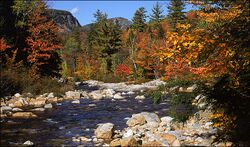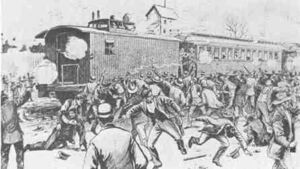History of New England
“What was the matter with Olde England, old chap?”
New England is the term colloquially used to refer to the Northeast section of the United States. It typically consists of six states: Connecticut, Rhode Island, Massachusetts, Vermont, New Hampshire, and The Southern Half of Maine. Canada can have Northern Maine back; we really don't want it. Also, don't let the New Yorkers trick you into thinking they're part of New England, too. This is our club, and they're not invited, so nyah. This region has had a long and colorful history. And I know what you're thinking: "Long and colorful!? No way!" But it's true.
Indigenous peoples
There were some, but they moved or died or something.
...Yeah, that's about it.
Early history
In 1620, the Mayflower arrived at what would become Plymouth, in what would become Massachusetts, in what would become New England. The people, though they did not know it yet, would mostly die after the first frigid winter. The pathetically small number of survivors, though they also did not know it yet, would eventually become the first New Englanders, and their descendants would have unlimited access to the high taxes and cold weather of this new promised land. Keep in mind that this is not counting the Native Americans in the area at the time, as they do not count.
It should be noted that they mostly died of smallpox anyways, when God noticed that white people, whom He loves more, were moving in, and would need some room to spread out and get settled in before they could take over the rest of this new land by force.
The early settlers of Massachusetts were spiritual idealists, seeking a haven from England, which had grown into a den of sin and heathens, where such heinous practices as divorce weren't even punishable by death. As such, New England was like New Coke, in that everyone everywhere agreed unanimously and without exception that it was way better than the original in every way and was totally worth the switch over from England Classic.
Less early history
The colonists of New England, along with other, warmer colonists from places less inhospitable, then went about the process of becoming uppity, officially separating from England after an argument over whether tea should cost three pennies or four. They fought England for their independence in 1776, and after winning, took a break until 1812, when the rest of the country decided it was high time for a rematch. Most New Englanders completely disagreed, even threatening secession, and were promptly and immediately ignored to the full extent of national law.
New England often rocked the boat against the grain of its own drummer, socially, politically, and economically. Just as Massachusetts and Connecticut's support of the Federalist Party grew strongest, the rest of the United States collectively went, "Mmmm...nah." Later, New England's support of the Whig Party similarly made the rest of the country mysteriously lose interest. New Englanders were also often more educated, and therefore more pompous in everyday conversation. As Henry Wadsworth Longfellow, an author from Maine, put it:
"I say, the commonplace riffraff most certainly appears to be rather exiguous here, wot."
In a letter of reply, popular transcendentalist Ralph Waldo Emerson wrote, "I must declare, plenty of sport and wager to be had 'round here," to which Longfellow replied:
"Cracker jack, old bean."
To this day, no one is quite sure exactly what these men were talking about. Pompous assholes.
Even less early history
New England, thanks to its numerous fast-flowing rivers, was one of the first areas to industrialize in the United States. This gave its numerous immigrants plenty of opportunity to work in the factories all day for not very much money, a prospect they were so pleased about that they immediately formed dozens of labor unions in gratitude, joyously demanding reasonable wages, happily rejoicing as they went on bitter, extended strikes, and ecstatically rioting for bread money and indoor toilets until the National Guard came and ended the euphoric party by force.
New England's many rivers were also important to the area's development in that they led to ample bays, bayous, gulfs, harbors, coves, bights, lagoons, and estuaries, which resulted in a prominent early shipping industry, particularly around Boston, and its creatively titled harbor, Boston Harbor. Seadogs and landlubbers alike convened in the city's many pubs to have discussions about matters that ranged from poopdeck-swabbing to mercantilist economic theory, but were mostly about the bartender's daughter, since she was, like, such a babe. Such an early and established source of revenue normally would have made New England a land of widespread economic prosperity, but unfortunately it was settled mostly by Puritans, who emphasized the spiritual value of being totally broke. Because of this, many New Englanders decided that principles were overrated, and made up their own religions, like transcendentalism, which was based on the idea that the pretty flowers in the woods were a good reason to become anti-social.
The least earliest history of all
Today, New England is known most prominently for its many colleges, its advancements in the field of biotechnology, and its numerous roadwork construction projects. New England's large college population, especially in Boston, has resulted in a kind of unique collegian culture, somewhat like a frat party that forgot to end. New England's interest in biotechnology stems from a more deeply-routed urge to bastardize God's will, which began with the legalization of gay marriage and has most recently probably included attempts to fund state-mandated aborted fetus bong-making, I bet. New England's many roadwork projects also demonstrate its deep commitment to making people late, which it does more efficiently than almost any other region of the United States. New England manages to do all of this while being the home of such successful sports teams as the New England Patriots, the Boston Red Sox, the Manchester Monarchs, the Pequabuck Penguins, and the Passamaquoddy Bay Unicorn Hunters.
The future
No one can truly know the future, but I don't really know the past either, and since I've already written a whole bunch about that, I think I might as well keep going. In the future, New England will change. Road cars will disappear as hovercars replace them, and allow traffic jams to take to the skies. Everything will be made of chrome. Androids will think they're actually people, and do battle against alien invaders for some reason.
Alternatively, Waterworld could happen; if this is the case, New England would likely be among the first places to sink, so New England residents are advised to invest in floaty water-wings, pool noodles, and perhaps a snorkel with which to catch starfish. Starfish, naturally, symbolizing the rising star that is New England. Yes, like a star New England has risen to great heights, and when it finally must meet its end we can only hope that it explodes in a spectacularly cataclysmic fireball of death.
See Also
| Featured version: 2 July 2009 | |
| This article has been featured on the main page. — You can vote for or nominate your favourite articles at Uncyclopedia:VFH. | |




